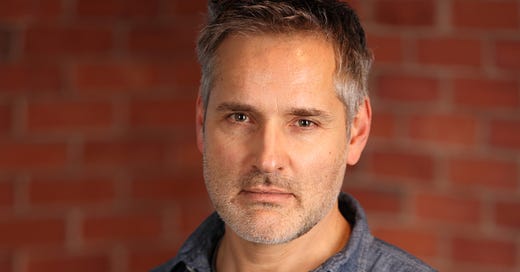Hello!
Alright, alright — I’ll start this newsletter by admitting that I’m posting this podcast episode, (my first in over 6 months, I should add) much later than promised because of some incredibly dull technical issues. Moving forward, I’ll be posting a newsletter on the first Sunday of the month, followed a couple of weeks later by a recipe and episode. This month’s episode, ‘The Philosophy of Loneliness’ is an interview with philosopher and head of philosophy at Bentley University in Boston, Axel Seemann. I’m very grateful to him for giving me some time to ask him some very non-academic and, at times, kinda-silly questions about loneliness.
In my opinion, because philosophy is an intangible and conceptual pursuit its impact can be often overlooked by the general public. Perhaps many don’t realise, but philosophy is incredibly important to humanity’s ability to solve problems. Far from simply conceptualising theories, philosophers mull over issues and pursue the very truth of the matter, whatever that matter may be (it might be art, it might be sex, it might be algebra). Philosophy teaches us how to observe and discuss the important things happening around us and given that we’re currently living through what has been named an epidemic of loneliness, it seems only natural that philosophy would shine a big, glaring spotlight (a SEARCHLIGHT, even) on the issue of loneliness. Nope. This absolutely wasn’t the case up until 2020, when Axel took up the gauntlet and began to research loneliness from a philosophical perspective. He has written a number of articles in journals and other publications on the philosophy of loneliness, organised a conference about the subject in 2020 and also has a fantastic podcast called ‘Loneliness and You’ which I recommend listening to.
In this episode of ‘How to eat alone,’ Axel and I discuss his research so far, why philosophy itself can be considered a lonely subject and how eating salad is great when you’re by yourself.
I find it so encouraging that when we give loneliness an academic and objective voice, it helps to shake off the stigma surrounding the subject and helps validate often difficult feelings. Thankyou to Axel for talking to me and I hope you enjoy this episode.
P.S I’ve added the episode transcript below, but you don’t have to read it, it’s very, very, very long…
Episode 12 Transcript - Interview with Axel Seeman by Julia Georgallis
Hi, welcome back to the How to eat alone podcast, with me, Julia Georgallis. I’m a baker and I write about food. This podcast discusses issues surrounding loneliness, solitude and solo dining. In it, I talk to different people about various aspects of being alone. Every episode comes with a recipe based on a meal that we’ve discussed during the show and each of these recipes are designed to be cooked and eaten by one person and one person only, because most recipes are written for two or more people, which is a bit annoying for the solo cook. The idea is that you can cook along whilst you listen to this podcast if you do find yourself alone. Think of this podcast as your dining buddy.
In the pursuit of trying to get to the bottom of what loneliness and aloneness are, I think I’ve employed two different tactics to try and do this - one is to ask for people’s subjective opinions and experiences of being alone, which are all valid. And the other is to look at loneliness in an objective way, as a subject in itself that can be studied without judgement and so far, from a more objective perspective, I have spoken to a psychotherapist and a psychologist on this podcast about loneliness and what loneliness means in their respective disciplines. But one subject that crosses paths with psychology (and also psychotherapy) is philosophy, and the philosophy of loneliness is one that has been largely ignored, even by philosophers themselves.
Now, you might wonder why is that so important? But philosophy is such a valuable discipline for humanity. Philosophers are people who, from the beginning of the kind of conscious times, if you can call them that, have been mulling over human problems and trying to find solutions to them really. Philosophy teaches us how to observe things that might be going on in our communities and societies and, you know, we’re currently living through what has been called an epidemic of loneliness, so it kind of seems only natural that philosophy would look at this subject, seeing as philosophy looks at everything really from maths to sexuality to art to happiness. But this isn’t the case when it’s come to the philosophy of loneliness in recent years. If philosophers aren’t philosophising on it, then where are the rest of us supposed to start from? This podcast episode’s guest Axel Seeman is a philosopher who has recently thrown the philosophy of loneliness back into the academic spotlight, which is brilliant.
Axel is the head of philosophy at Bentley University in Boston. He organised a conference as well on the philosophy of loneliness in 2020 at the beginning of his research and he also has a podcast called Loneliess and You, which is about the research and experience of loneliness, and it’s usually from an academic lens and it’s well worth a listen to, I think it’s brilliant. I ask Axel some questions about his work and what he’s learnt about loneliness from a philosophical perspective so far.
JG: Thankyou so much for chatting to me.
AS: Thanks for having me! Pleasure to be here
JG: Maybe you can explain a little bit about what you do and what your research into loneliness entails
AS: I’m a philosopher. My work is mostly in the philosophy of mind. I’m interested in things like consciousness and perception and in particular I’m interested in the social aspect of that so you know what really fascinates me is how minds hang together, how minds come together, how things like joint action, shared experiences, shared perception is possible. That’s not a trivial question because you could think that our brains generate minds or at any rate are correlated to minds and so each person with one brain has got their own mind but then, you know, we can connect these minds in really interesting ways and really important ways for social creatures like us and the key question at the heart of my research is how is that possible so this is a question that you can think about philosophically but you can also think about it psychologically and can think about it a little bit in terms of neuroscience as well. I’ve been working on this for a long time. A few years ago I wrote a book on all of that and the book took for absolutely ever and then I wanted a new topic that was a little bit less abstract and more, you know, concerned with everyday problems and so I stumbled across loneliness which at that time hadn’t really been discussed much in philosophy. In a way I came across it because I saw it in a way as sort of the flip side of what I had previously been doing and what happens when the social connection that’s so important for all of us isn’t there? What happens to a person then? What happens or may happen is that the person feels lonely and so that’s how I got started.
JG: And how has your research been received in the wider world?
AS: Philosophers often don’t communicate very much with the wider world and you can think and I sometimes think in weaker moments that that’s a weakness of our discipline, that we have become quite academic, that we mostly talk to each other. Or perhaps we talk to people in adjacent disciplines and so I haven’t really published very much that would address loneliness in a way that would be accessible to the wider world. I’m hoping to do that, I’m hoping to soon write a book that is of a more popular character, but I haven’t written it yet.
JG: Right and that’s really interesting actually, cos it’s sort of how you’re describing philosophers as quite a lonely discipline.
AS: Yes! I think that’s right. I think writing anything can be a very lonely thing to do, right? Unless you’re writing it with someone else. But if you’re an actual scientist then you have a lab and in the lab you do experiments and you have people with whom you do the experiments and so you have collaborators and in philosophy very often that doesn’t happen and, you know, pure philosophy you might think is sort of a conceptual undertaking, a conceptual analysis and that’s really something that, you know, people do by themselves and, yes you’re right when I’m not teaching which is obviously a big part of my job, I am very much on my own and by myself and so I think you’re right in thinking that philosophy can be quite a lonely discipline. Like the book that I’m hoping to write will in fact look at some famous philosophical figures and investigate their lives and their work and from this lens of loneliness. You can think of characters like Nietze for example or Wittgenstein and these were probably really lonely individuals you might imagine. This is somehow reflected in their work.
JG: Just while you were talking I was thinking, one thing that I also think, as I’ve been working on this podcast when people ask me ‘what are you working on?’ and I tell them I’m working on a podcast and it’s about loneliness, they kind of look at me like… ‘are you alright?”
Do you find that?
They both laugh
AS: I don’t find that that much. So I’m coming at this very much as the philosophy professor who investigates but I definitely (giggles) see what you mean. So in the past few decades, a particular strand in philosophy has become quite interested in things like mental illness or depression and the investigation of loneliness is sort of broadly in line with that strand of research. I think if you’re a really purist philosopher who really only wants to think about the nature of truth and the nature of reference in linguistic expression or moral norms in a really abstract way then it can perhaps strike you as a bit funny that philosophy would investigate these problems, mental health problems.
JG: You mention that you spend quite a lot of time by yourself when you’re not teaching. What does loneliness mean to you on a personal level?
AS: Briefly. Like very briefly reflecting on the work on loneliness that I have looked at and that I’m doing myself, it’s really interesting that it’s an incredibly hard to pin down phenomenon. It’s really hard to say what that actually is. Different people are going to answer the question ‘what is loneliness for you’ in quite different ways. For me personally there have been periods of my life where I have been intensely lonely, not now, I spend a lot of time by myself. But just because you’re by yourself doesn’t mean that you’re lonely necessarily, you can be very happy by yourself. You can be a very happy hermit. You can be a lonely socialite as well. Loneliness so far as it’s been motivated by my personal life experience for me it’s happened when there were particular people who for some reason or other I wanted to be there and they weren’t there. So this is one kind of loneliness that in the literature is called episodic loneliness because it’s tied to particular life events, deaths, break ups that’s contrasted often with chronic loneliness where people just feel lonely no matter what. Where it seems to be sort of an existential condition of their life. I don’t know that from personal experience.
I mean there are people who argue, controversially, very controversially, but there is a prominent argument that says that if we didn’t at least have the capacity to experience loneliness, whether it’s exercised or not but if we didn’t at least have the capacity to experience loneliness, separation, we couldn’t be selves. Right? We couldn’t be the kind of creatures who we are, where our mental mode of being is massively characterised by self awareness. For us, the self awareness is very much at the centre of our experience and you can think, some people think that if that’s to be possible then loneliness has to be possible too.
JG: Like we can’t be ourselves without being lonely
AS: If that’s true. Other people think that you know that that’s not the correct view, that what makes us selves is the opposite, is togetherness with others, it’s interaction with others that you learn how to distinguish yourself from other people so it’s not tied to loneliness but to a social mode of being.
JG: So you organised a conference on loneliness a couple of years ago. It would be great to just explain what that entailed and was there an overall takeaway from that conference.
AS: You know the conference was virtual, so this was in 2020, it was really late Covid. My motivation for organising it was two fold. First of all I often do that when I begin a new topic of research, then I organise a conference because I wanna hear what other people think basically and that, you know, helps me to get going. But then also, in philosophy up to that date there had been, at least in contemporary philosophy, there had been almost no work on loneliness, interestingly, weirdly, psychologists have worked a lot on it but in contemporary philosophy there was almost nothing, one or two papers and I thought this is so weird because the discipline should have so much to contribute and so I wanted to kick start that discourse and so that was the second reason for organising this conference and it turned out to be much bigger than I thought it would be. I had I think almost 200 guests and like 30-40 speakers, so you know like a full philosophy conference that’s really quite big. I think the takeaway really was that there is no unified way of thinking about loneliness, you know something that needs to be thought about, but realistically in different contexts.
JG: There’s a lot of work to be done on it still.
AS: I think that’s right, yes, I think that we are conceptually only beginning to be able to describe it better. For a long time, empirical work has been adopting versions of the definition of loneliness as something like ‘the absence of desired social contact’ or something - ‘the painfully felt absence of desirable or desired social contact’ and that’s not false, but it’s way too broad. There’s so, so much and we’re not only beginning to make it more precise and distinguish it and describe it better, so there’s loads of work to be done still.
JG: I know that maybe we’re never going to be able to define it properly because it’s so broad and so massive but it is really great that it is being spoken about in academic circles because on this podcast, a lot of people that I’ve spoken to about this topic have always talked about that there’s a shame in loneliness, that there’s this emotional shame and you’re talking about how difficult it is to talk about it and I think it’s because it’s tied to that shame, whereas when it’s academic you just take the shame out of it. If you’re talking to 200 academics about this thing, like, there’s no reason for anyone to feel ashamed in a way, you know it’s quite validating.
AS: You know, so definitely, it’s a stigma, right, you can easily see that for yourself when you go to a party where you don’t know anybody and everybody else knows each other and they talk to each other and nobody really talks to you, it’s not only that this is unpleasant but this is shameful, somehow, like you feel like you are the loner, without friends and that’s not only not pleasant but something that’s somehow your fault, amazingly. And overcoming that I think is a vital aspect of this kind of research as of related issues, you know depression is sort of a similar story, people can feel the same that they’re depressed, where you wouldn’t feel ashamed because you’ve got mumps or something but for mental conditions you do and academic work can do a lot to alleviate that absolutely by making it recognised as what it is which is an illness. I mean not to say that loneliness necessarily is an illness - loneliness is connected also to solitude right and solitude can be a beautiful thing. When we hear loneliness today, you know historically that wasn’t always the case, this distinction between positive solitude and negative loneliness is about 200 years old I think and before that we didn’t make that distinction really, but sometimes loneliness, a bit of loneliness can also be a good thing because it tells you something. It may tell you ‘look so you should go out a bit more’ or something if it’s not debilitating and doesn’t make you, you retreat even more into your own shell which of course it can also do.
JG: Yeah I mean I think it’s a really useful thing.
AS: I mean one of the most prominent definitions or theories of loneliness in psychology by somebody called Cacciopo who’s a very prominent researcher is that loneliness is like hunger, it’s basically the social equivalent of hunger, so when you’re hungry your body tells you you need to eat something, when you feel lonely on that view then your body, mind, embodied self tells you that you know you need to have more social contact, whilst I think you know that is too, that falls short, that’s too simple, that doesn’t do this complex phenomenon entirely justice, it’s nevertheless an interesting thing to think. So the more I think about it, the more I come to the view that loneliness is actually not directly a report on other people and their presence or absence but it’s a kind of a self report. I think that the experience of oneself features very prominently in loneliness, much more than it would feature in somewhat related emotions such as perhaps homesickness, you know when you suffer from a broken heart, also when there’s something that should be there in your life but it isn’t there, grief, also related, you know somebody has died. But in these emotions the focus is really on what’s not there and the more I think about loneliness is that I think loneliness is predominantly about yourself.
JG: Yeah, I think when I interviewed a psychologist the idea of loneliness being a kind of physical survival instinct did come up. But, um, I guess this leads onto my final question very well, bringing up Cacciopo’s theory that loneliness is like a social version of hunger - has the topic of food ever come up in your research at all?
AS: So the answer’s just no! You know there is a philosophy of food, that is a thing, it’s not something that I’ve encountered or really thought about philosophically. This will also have to do with the fact that I myself am not a foodie, you know, I’m not a very good cook. I like cooking for my friends, but they all know which of three dishes I can make they’re going to get, because it’s only one of three. I love eating salad you know, I eat salad all of the time. I just think salad is the perfect food like you know, like a salad with lots of stuff in it, I eat that literally every day.
JG: Do you?
AS: Yeah!
JG: I hate salad!
AS: Do you?
JG: And if I’m eating a salad it has to be a chunky salad with lots of stuff in it so I forget that I’m eating a salad.
AS: Yeah that’s right, yeah, yeah, I have to have other stuff in it as well but for me it’s like the perfect meal, it’s mostly raw and it’s got all sorts of different veg in it and it’s got different colours and then a little bit of got goat’s cheese or something with it and a nice dressing and there you go! And it’s like really healthy and good for you, it’s substantial and it’s perfect, I love it, I eat it every day. I suppose I just got into this routine, I’m very much a person of routines, so like I establish stuff and then I do it for the next decade, I just got into this habit of making salad and now I just make it.
Julia laughs
JG: Yeah that’s great - that’s fantastic!
Thankyou to Axel for such an enlightening discussion about loneliness. I find the work that he is doing incredibly encouraging and important. I know that there are a lot of empirical studies like psychological studies and scientific studies on loneliness and there are a lot of tangible solutions to loneliness being offered in society like support groups and schemes for the elderly and the isolated, but the fact that there are 200 people willing to go to a convention on the philosophy of loneliness to THINK conceptually about what loneliness is is real progress to me because it says to the wider world that loneliness is worth thinking about, it is worth scrutinising and trying to get to the absolute bottom of it and that shakes off the stigma surrounding it.
When I said I hated salad, I think I might hate the idea or the salad and the kind of reputation that precedes it. I think that I generally associate it with anaemic iceberg lettuce and over processed dressings. But then when I make salads for myself and I trick myself into eating salads and fill them full of delicious things, then I remember that I shouldn’t be so hard on them, and that they can be delicious and, like Axel says, they are actually pretty practical foods for the solo chef so actually I think I just hate being served a salad by someone else, I think I enjoy making them for myself - I’ve spent this week making salads. I’ve shared a recipe for one of my favourites on the podcast’s website - it’s a goat’s cheese, lamb’s lettuce, green bean and grilled tinned pears with an olive oil and lime dressing. The reason I used tin pears, not fresh pears - I mean you can use fresh pears if you like - is because I do actually think tins, as well as salads, are fantastic for the solo cook because it’s much less preparation and depending on what it is it’s quite often cheaper - maybe the subject of tinned food is a podcast topic for another time.
For those of you who may have been listening to this podcast for a little while, you might have noticed some changes! Over the couple of months I’ve been cleaning up and editing episodes and I’ve moved the podcast and all of its recipes over to Substack, which is a platform for writers and journalists to publish their own work directly to subscribers - if you want to you can subscribe to my Substack newsletters - head to howtoeatalone.substack.com, where I’ll publish podcast episodes, recipes for one and an additional monthly newsletter which will be all about loneliness and solitude. Of course you don’t have to sign up for the Substack to keep listening to this podcast of course, it’s still available on all they different podcasting channels. The recipe, as well as this episode are both up on the Substack page, I’ve also posted links to Axel’s website, to his work, his podcast ‘Loneliness and you’ those are all up on the episode’s page. You can also find out more information about this podcast, or send me a message or let me know what you think on the instagram page, the handle is @howtoeatalonepodcast. Thankyou for listening to me. As always I hope you’ve enjoyed being alone with me for this episode - I’ll see you next time for the next episode of ‘How to eat alone…’













Share this post